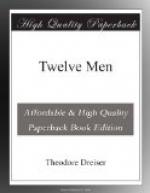“Dyer, I’m almost gone. I am in the shadow of death. I am standing upon the very brink. I cannot see clearly, I cannot speak coherently, the film of death obstructs my sight. I know what this means. It is the end, but all is well with me. I have no fear. I have said and done things that would have been better left unsaid and undone, but I have never willfully wronged a man in my life. I have no concern for myself. I am concerned only for those I leave behind. I never saved money, and I die as poor as when I was born. We do not know what there is in the future now shut out from our view by a very thin veil. It seems to me there is a hand somewhere that will lead us safely across, but I cannot tell. No one can tell.”
This interesting speech, made scarcely a day before he closed his eyes in death, was typical of his whole generous, trustful, philosophical point of view.
“If there be green fields and placid waters beyond the river that he so calmly crossed,” so ran an editorial in the local county paper edited by one of his most ardent admirers, “reserved for those who believe in and practice upon the principle of ’Do unto others as you would have them do unto you,’ then this Samaritan of the medical profession is safe from all harm. If there be no consciousness, but only a mingling of that which was gentleness and tenderness here with the earth and the waters, then the greenness of the one and the sparkling limpidity of the other are richer for that he lived, and wrought, and returned unto them so trustingly again.”
Culhane, the Solid Man
I met him in connection with a psychic depression which only partially reflected itself in my physical condition. I might almost say that I was sick spiritually. At the same time I was rather strongly imbued with a contempt for him and his cure. I had heard of him for years. To begin with, he was a wrestler of repute, or rather ex-wrestler, retired undefeated champion of the world. As a boy I had known that he had toured America with Modjeska as Charles, the wrestler, in “As You Like It.” Before or after that he had trained John L. Sullivan, the world’s champion prize fighter of his day, for one of his most successful fights, and that at a time when Sullivan was unfitted to fight any one. Before that, in succession, from youth up, he had been a peasant farmer’s son in Ireland, a scullion in a ship’s kitchen earning his way to America, a “beef slinger” for a packing company, a cooks’ assistant and waiter in a Bowery restaurant, a bouncer in a saloon, a rubber down at prize fights, a policeman, a private in the army during the Civil War, a ticket-taker, exhibition wrestler, “short-change man” with a minstrel company, later a circus, until having attained his greatest fame as champion wrestler of the world, and as trainer of John L. Sullivan, he finally opened a sporting sanitarium in some county in upper New York State which later evolved into the great and now decidedly fashionable institution in Westchester, near New York.




